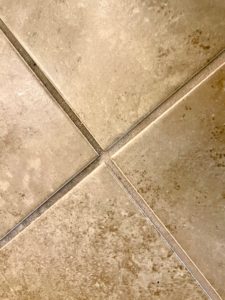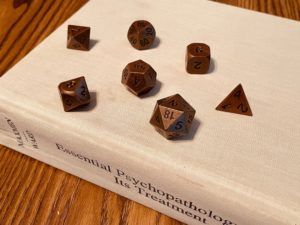
The Most Important Question – The Scrubbing Bubbles Story
Sometimes, therapy is REALLY easy and short.
But first, let me tell you a story.
So, I was cleaning the kitchen tile grout when I moved into my new house. (Yes, those are my actual kitchen tiles, in progress. ACK! And it is beige grout, not white, just so you don’t get all judgey on me! Haha! ) This is how that went: Squat, Spray, Wait, Scrub, Spray, Wait, Scrub, Rinse, Heave-off-of-creaking-knees-to-move-two-feet, Squat, Spray, Wait… for FIVE HOURS. And then, something happened that I thought was a complete disaster. … Halfway through my kitchen, I ran out of spray.
“Oh no!” I thought to myself. “Now I’m going to have to change sprays and use the crappy spray under my sink that is not the special spray I bought for cleaning tile grout and it’s going to be so much more work and so much more time… WAAAAAAAH!” But I decided to do that (rather than, I realize now, going to the store and buying more, which possibly could have saved me a bunch of time, but I was messy and sweaty and cranky and didn’t want to.) So, I huffed out a breath and got the other spray out from under my sink.
It was a miracle spray. WHAT?! NO squatting – the spray stream was awesomely direct and I could spray every grout line standing up. NO waiting – by the time I got back to my initially-spray tile, it had already done its work. Almost no scrubbing – this spray was amazing effective! I finished the rest of the kitchen in under an hour.
So much pain and effort and time saved, by just trying something different that was already at my disposal, even though I thought it wouldn’t work.
Some of the ways this has shown up in therapy:
- How’s your sleeping?
- Have you recently changed medications?
- Are you sure that’s necessary?
- Did you tell them that out loud?
I probably could have titled this “The Most Important Question – What have they tried so far?” But then, that would have been too easy and short, right?
Comment below: What have been some of the wildly easy “fixes” that have made a big impact for your clients?
